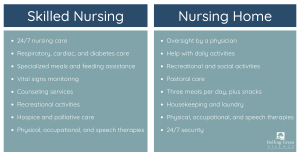
People often compare care offered at a skilled nursing facility versus a nursing home because the terms are sometimes used interchangeably, leading to confusion. However, there are distinctions between the two, and understanding these differences is crucial for individuals and families seeking appropriate care options for their loved ones.
What Is a Skilled Nursing Facility?
A skilled nursing facility (SNF) is a healthcare institution or residential setting that provides specialized medical care and rehabilitation services for individuals with complex healthcare needs.
SNFs play a crucial role in the continuum of care, offering a higher level of medical attention than typical assisted living or nursing home communities. Short- and long-term skilled nursing can be provided in hospitals, assisted living communities and Life Plan Communities, as well as nursing homes and other certified locations.
Many individuals transition to a skilled nursing facility after a hospital stay for continued medical care and rehabilitation before returning home.
What Are the Care Offerings at a Skilled Nursing Facility?
Skilled nursing facilities (SNFs) provide comprehensive care services for individuals with complex medical needs or those recovering from surgery, illness, or injury. The care offerings at a skilled nursing facility typically include:
1. Medical Care
- 24/7 Nursing Care: Skilled nursing facilities have registered nurses (RNs) and licensed practical nurses (LPNs) available around-the-clock to provide medical care and supervision
- Medication Management: Monitoring and administration of medications as prescribed by healthcare professionals
2. Rehabilitation Services
- Physical Therapy: Rehabilitation services to improve mobility, strength, and coordination
- Occupational Therapy: Assistance with activities of daily living and fine motor skills
- Speech Therapy: Evaluation and treatment for speech and language disorders
3. Medical Procedures
- Wound Care: Treatment and care for wounds, surgical incisions, or injuries
- Intravenous (IV) Therapy: Administration of medications, fluids, or nutrients through intravenous lines
- Pain Management: Monitoring and addressing pain through various interventions
4. Specialized Care
- Respiratory Care: Assistance for individuals with respiratory conditions, including ventilator support and oxygen therapy
- Cardiac Care: Monitoring and management of heart-related conditions
- Diabetes Management: Monitoring blood sugar levels and managing diabetes care
5. Nutritional Support
- Dietary Services: Specialized meal plans to meet individual dietary needs
- Feeding Assistance: Support for individuals who require assistance with eating or feeding tubes
6. Monitoring and Supervision
- Vital Signs Monitoring: Regular monitoring of vital signs, such as blood pressure, heart rate, and respiratory rate
- Fall Prevention: Implementing measures to prevent falls and injuries
7. Psychological Support
- Counseling Services: Emotional and psychological support for residents and their families
- Recreational Activities: Engaging activities to promote social interaction and mental well-being
8. End-of-Life Care (Hospice Care)
- Palliative Care: Supportive care to enhance quality of life for individuals with serious illnesses
- Hospice Care: End-of-life care focused on comfort and dignity
9. Respite Care
- Short-Term Care: Temporary care services to provide relief for primary caregivers
Skilled nursing staff includes:
- Medical directors
- Registered nurses
- Licensed practical nurses
- Licensed vocational nurses
- Speech/language pathologists
- Audiologists
The community providing short-term care also must have a transfer agreement with a hospital in case a resident requires emergency care.
It’s important to note that the specific care offerings may vary among different skilled nursing facilities, and the services provided are tailored to the individual needs and medical requirements of each resident. Skilled nursing facilities play a crucial role in facilitating recovery and enhancing the overall well-being of individuals with complex healthcare needs.

What Is a Nursing Home?
A nursing home is a permanent residence for seniors who cannot live at home. Nursing homes provide custodial, nonmedical care to adults who need help with day-to-day activities:
- Daily help with getting in and out of bed, grooming, bathing, and getting dressed
- Light housekeeping services
- Provide meal services
- Assistance using the bathroom
- Transportation services
Nursing homes are staffed by certified healthcare workers, but registered nurses or doctors may not always be available.
What Are the Cost Differences?
The cost differences between a skilled nursing facility and a nursing home come down to a couple of factors:
Skilled Nursing Facility:
- Higher cost for specialized medical care and short-term rehabilitation
- Ideal for post-hospitalization recovery and short-term intensive care
Nursing Home:
- Lower cost that focuses on long-term custodial care
- Suited for those requiring assistance with daily living on a prolonged basis

Choosing the Right Option
Consider medical needs, care duration, finances, and quality of life, and consult healthcare professionals when deciding between an SNF and a nursing home for your loved one.
Regulations for Skilled Nursing
- Skilled nursing is mostly regulated by the U.S. Department of Health and Human Services and CMS.
- To be certified by CMS, skilled nursing facilities in Greenville, SC, must meet strict criteria and are subject to periodic inspections to ensure quality standards are being met.
Regulations for Nursing Homes
- Nursing homes in Greenville are regulated by the South Carolina Department of Health and Environmental Control. The U.S. Department of Health and Human Services’ Centers for Medicare & Medicaid Services (CMS) also oversees and regulates all aspects of each nursing home.
- Nursing homes are given inspections called surveys, which look for violations or immediate threats to patient safety and satisfaction. The nursing home administrators then propose a plan of correction to address their violations. If a nursing home fails to improve, it could be fined, or their license or the admission of new residents could be suspended.
Helpful Tips and Questions To Ask
If you’re evaluating care options for yourself or a loved one, here are some helpful tips to get you started and important questions to ask.
Tips:
- Reach out to people you trust to be unbiased – friends, family members, or a physician – for their candid advice and recommendations.
- Once you have a list of care options, visit the South Carolina Department of Health and Environmental Control Division of Nursing Homes to check their rating.
- You can also check a community’s online reviews, but because personal reviews can be very subjective, it’s important to weigh them with other information you’ve already collected.
- Once you’ve narrowed down your list, start scheduling visits to your top communities. As you’re doing this, consider other details, such as how the community answers the phone, the time it takes for them to return messages, and their helpfulness.
When you’re taking a tour of a skilled nursing facility, be sure to keep this checklist in mind.
Compassionate Care at Rolling Green Village
If you’re unsure whether skilled nursing or a nursing home is best for you or your loved one, contact your doctor or physician to assess what services you’ll need now or in the future.
If you’d like to learn more about Rolling Green Village or discuss your care options, use our contact form or call 864-558-9301.





